Table of Contents | Introduction | Chapter 1 | Chapter 2 | Chapter 4 | Chapter 5 | Chapter 6
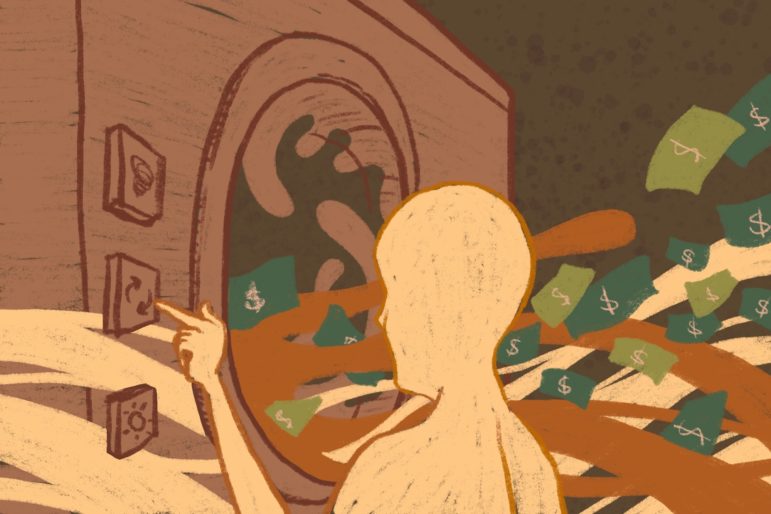
Illustration: Nodjadong Boonprasert for GIJN
The purpose of money laundering is to turn funds derived from illegal activities, such as the Golden Triangle drug trade, into legal assets such as bank deposits. Traditionally, incomes from the drug trade and other illicit activities in the Golden Triangle were laundered through banks in Thailand, Hong Kong, and Singapore. The funds would then be sent through a series of regional and international bank accounts and finally into a private or business account somewhere in the world, where it would be next to impossible to trace the origin of the money.
How It Works
According to international financial experts, money laundering goes through three main stages: placement, layering, and integration. It works like this:
- Placement. Drug addicts and small-scale dealers pay in cash to their suppliers, who end up with lots of paper currency in different denominations, which have to be deposited — or “placed” — into bank accounts. Locally, that can be done by funneling them through other cash-intensive businesses such as bars, nightclubs, restaurants, supermarkets, and petrol stations. In Thailand and China, and to a lesser extent Laos and Myanmar, cash is brought to a bank and, if any questions are asked, the depositor can show that he or she is the owner of one of those entities. In countries outside the region, to which the drugs have been smuggled and sold to local addicts, money laundering can be done by a method known as “smurfing.” The nickname comes from so-called hired hands — “smurfs” — going in and out of different banks and making deposits of illegal funds into multiple accounts (often using various aliases). Most banks in Australia, the United States, and Europe have limits on how much cash can be deposited into a single account without it being reported to tax authorities. As a result, “smurfs” typically make deposits just under that limit. In this way, money enters the financial system without drawing the attention of governmental institutions or financial watchdogs.
- Layering. This is the second step, whereby a money launderer breaks up large bank-to-bank transactions into a series of smaller transactions that fall under the reporting threshold of most Western financial institutions. In the US, Europe, Canada, and Australia, the daily limit for depositing or withdrawing money without the banks having to report it to governmental tax authorities is roughly US$10,000. Breaking up these transfers effectively disconnects money derived from illegal activities from the actual source, which could be drug trafficking or any related illicit business. Generally, the more layers that tainted money passes through, the harder it becomes for law enforcement authorities to track funds back to any criminal activity. Layering can include changing the nature of the origin of the assets, which could be claimed to be from the sale of gold, winnings at a legal casino in Macau or elsewhere, legitimate real-estate deals, or other above-board ventures. This is often done by sending the money around the globe using a series of transactions involving “tax havens” and “financial services centers” in offshore locations. The more jurisdictions the money passes through, the harder it becomes for the authorities to uncover the actual source of the money.
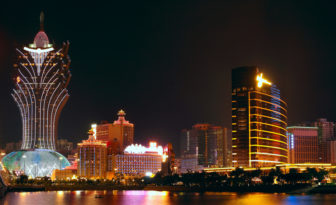
Claiming winnings from casinos in Macau can be a way to hide dirty drug money, making it harder to track back to its source. Image: Shutterstock
- Integration. In the final stage, once the illegal assets have been placed, layered, and hidden behind supposedly legal business enterprises and bank deposits, the funds have to be integrated into the legitimate financial system. This must be done through legal sources to create a plausible explanation for where the money originates. This money is then sent back to the people from the criminal organizations that invested in the Golden Triangle drug trade or other illicit activities. After this third stage, it becomes next to impossible for law enforcement agencies to distinguish between legal and illegal incomes, and the criminal organization that laundered the money can now use it with little or no chance of getting caught. The previously “dirty” money has been successfully cleaned and absorbed into the mainstream economy, and can now be used for investment in real estate or other legitimate business enterprises, or simply to finance the criminals’ lavish lifestyles.
However, in some countries such as Thailand, following all three steps may not be necessary, since large amounts of funds can usually be deposited into one account and transferred to an overseas bank with no questions asked. But if that destination account is in a country such as the US, Canada, Australia, or Europe, transfers would still have to be broken up into smaller amounts to avoid the reporting requirement.
In addition, there is also a local method for hiding dirty money from the prying eyes of international financial authorities: underground banking systems. In South Asia and the Middle East, this underground network is called hawala, in Southeast and East Asia it is called hai wai (“overseas”), hui kuan (“remittances”), or chao hui, which means currency investment or speculation. Some refer to it as fei qien, or “flying money,” which is something of a misnomer given that, as in hawala, the money never actually leaves the place where it was originally deposited. These “underground banks” can transfer money worldwide faster and more efficiently than ordinary banks, which are burdened by bureaucracy and legal restrictions. These banks leave no paper trail to be scrutinized by local tax authorities or intelligence agencies, which are trying, often in vain, to track the global flow of illicit and semi-illicit “gray” money (i.e. earnings from “tax avoidance” or unfair business practices).
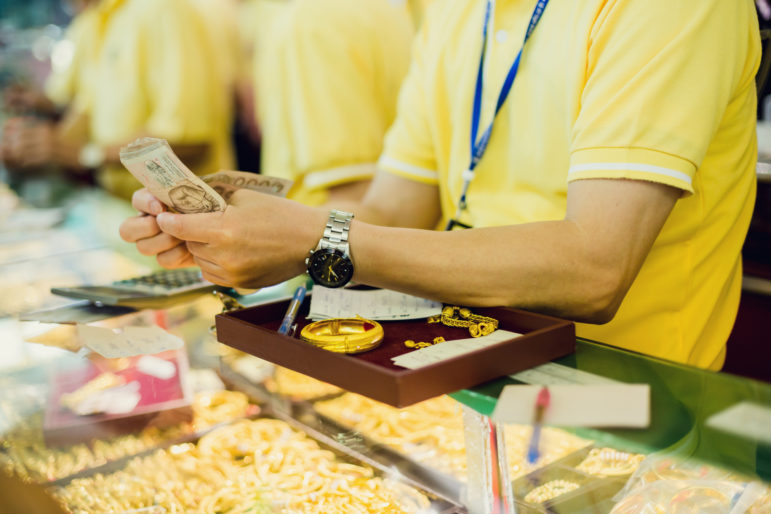
A gold dealer in Yaowarat, Bangkok. “Fei qien” or “flying money” operators often double as a travel agents, money changers, or gold dealers, crediting funds from one such business to another. Image: Koonsiri Boonnak/iStock
How it works: a hawaladhar or a fei qien operator often doubles as a travel agent, money changer, or gold dealer. If a criminal wants to transfer money from, for instance, Chiang Mai in northern Thailand to China, Hong Kong, Singapore, or Dubai, he can deposit any amount of cash into one such enterprise and another — or the same — person can pick up the same amount at a connected travel agent, money-changer, or gold dealer in any of those jurisdictions. In other words, if a Chinese businessman wants to transfer money to Thailand, he can pay Chinese renminbi to a travel agent or gold dealer in Kunming or Hong Kong and pick up the equivalent in Thai baht from a money changer in Chiang Mai or a gold shop in Bangkok. In the past, a banknote ripped in two — one part for the person who was going to pick up the money and the other for those who were going to hand it over — was used to identify the sender and the receiver of the transaction. These days, all that is needed is a coded phone call, SMS, or email.
An underground banking operator can also move money out of a country by importing goods at overvalued prices and exporting goods at undervalued prices and vice versa. Almost any type of product can be used as cover for this laundering tactic: electronics, textiles, expensive carpets, foodstuffs, or building materials. Regardless of which one is used, the parties involved still have to balance their books since someone is running a deficit and somebody a surplus. This can be done through more informal transfers or by personally visiting banks to collect the cash in a local currency or in US dollars. Anywhere from one to four times a year, the various members of the drug network communicate with each other and settle their ill-gotten balances.
But the whole system depends on trust, and if the trust is violated, the consequences can be severe for anyone who tries to run off with the money. International law enforcement agencies have not been particularly successful in trying to stem the flow of money through Asia’s underground banks. After 9/11, the US tried to crack down on hawaladhars in Dubai and elsewhere in the Middle East because they had been used to finance terrorist activities. Fei qien operators were also targeted, but two decades later, they — and the hawaladhars — are once again operating with impunity, and spreading their tentacles across Asia, including the Golden Triangle.
Background
The region’s economic boom began when, in March and April 1989, the hill tribe rank-and-file of the insurgent Communist Party of Burma (CPB) mutinied against its aging, orthodox, mainly Burman leadership and drove them into exile in China. Four ethnic armies emerged from the old CPB, and that coincided with the flight of thousands of pro-democracy activists from urban centers to the frontier areas. They had fled from massacres in the old capital Yangon and other cities and towns and wanted to fight together with the ethnic rebels against a new military government that had seized power in September 1988. But those ethnic armies had only a handful of weapons that they could share with the urban activists. Only the former CPB forces had warehouses of weapons which had been supplied by China during the decade 1968-1978. With now only ethnic rebels in the country, there was the possibility of an alliance between the former CPB forces, now ethnic armies, and the other resistance forces, which could have changed the course of Myanmar’s decades-long civil wars. In order to thwart that threat, the new junta in Yangon approached the CPB mutineers and made them an offer: maintain control over your respective areas and keep your guns — and you can engage in any kind of business as long as you don’t fight us and don’t share your arsenal with the other rebel groups. The mutineers, who controlled vast poppy growing areas in the Golden Triangle, accepted the offer, and opium production more than doubled within a year after the mutiny.
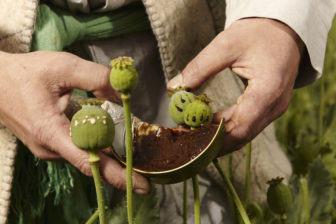
Farmers harvest raw opium by using tools to scrape lines into the plant’s pods, which then leak raw opium, and is collected and dried into opium gum. Image: Shutterstock
The threat against the junta had been neutralized, but the cease-fire agreements also meant that an entirely new era in the Golden Triangle drug trade was ushered in — and with it came huge amounts of money that had to be laundered, some of it through the newly established casinos, but most of it through banks in Myanmar and Thailand.
When methamphetamines joined opium as a Golden Triangle drug production staple, the region also experienced the arrival of an abundance of casinos, in which drug money and income from other illicit activities can be easily laundered. This new boom in gambling centers, many of which count organized crime gangs as investors, was fueled by the establishment of the so-called Special Economic Zones to promote business in northwestern Laos and eastern and northern Myanmar. According to the United Nations Office on Drugs and Crime (UNODC), “an estimated 240 casinos have been built in 120 SEZs in the Mekong subregion and some of these areas have become hubs of serious criminal activity.”
The first casinos were established in areas controlled by the National Democratic Alliance Army-Eastern Shan State (NDAA-ESS), one of the groups that emerged from the collapse of the Communist Party of Burma in 1989. This group’s headquarters at Mong La on the Chinese border was transformed from a village consisting mostly of bamboo huts to a modern city with luxury hotels, fancy restaurants, brothels, and many casinos. The NDAA-ESS was also involved in the drug trade and associated with other drug-trafficking groups in the Golden Triangle. Before the COVID-19 pandemic and the imposition of China’s “zero-COVID” policy, which still remains in force, thousands of tourists from China crossed the border each day to enjoy the entertainment that was provided in Mong La, in particular the casinos, because gambling is banned in China. This cross-border traffic led to a massive outflow of money from China — and the Chinese authorities have therefore on several occasions, tried to control the tourist trade in Mong La. But they’ve had limited success because the NDAA-ESS leadership has a relationship with China’s security agencies that goes back decades, to the Communist Party of Burma (CPB) days. Casinos were also established along the China-Myanmar border area controlled by the United Wa State Army (UWSA), the main ethnic force that emerged from the collapse of the CPB. But the UWSA earns most of its money from the trade in opium, heroin, and, now, methamphetamines.
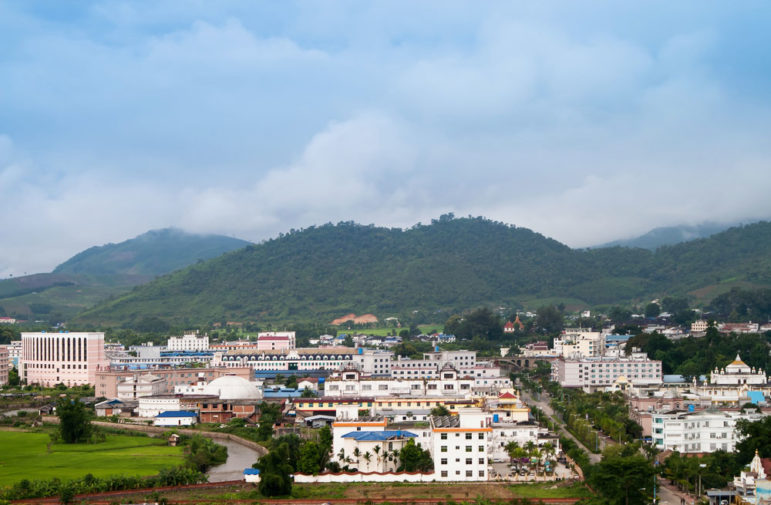
Mong La city in Shan State, Myanmar, borders China’s Yunnan province. Thanks to illicit money and Chinese tourists, Mong La has been transformed from a sleepy village into a modern city with luxury hotels, upscale restaurants, brothels, and many casinos. Image: Shutterstock
Tips and Tools
Writing about these issues is a challenge. First of all, it is difficult to prove that money has been laundered for the simple reason that the goal is to make illicit funds untraceable. Many people who are involved in these activities are also prone to suing journalists who have dared to expose them. The best way to approach the problem is to describe how the system works without pinpointing anyone in particular unless an allegation can be backed up by legal documentation.
It is also risky to physically enter the casino enclaves as a journalist. The only way would be to work undercover and pose as a would-be gambler, but utmost caution must be exercised when taking pictures. (For more on best practices of clandestine reporting, check out GIJN’s Guide to Undercover Reporting.)
Hiring trusted local collaborators such as experienced journalists and NGO workers is a must before venturing into these areas, because the local police in Thailand as well as in Myanmar, Laos, China, and Cambodia are often on the criminals’ payroll.
At the same time, a visit to the Golden Triangle casinos has to be followed up by internet searches, and there are many links such as these:
- Educate yourself on money laundering and terrorist financing. Read this website put together by the Financial Action Task Force (FATF), a global money laundering and terrorist financing watchdog.
- Here’s a list of useful websites related to money laundering.
- Use the World Casino Directory to collect information on casinos in the region.
- Read about the Australian police’s definition of cuckoo-smurfing along with its guide on financial crime.
- For more information about drug trafficking spilling over into domestic markets read this paper by the Lowy Institute in Australia.
- If you’re interested in Mong La, Vice traveled to “the town where you can buy drugs, sex, and endangered animals.” Time Magazine did a story on Burma’s “debauched land of drugs and vice,” while the Institute of East Asian Studies at UC Berkeley also published this paper on the region.
- Read here what the UNODC is saying on casinos in the Laos and Myanmar Special Economic Zones and this story from The Diplomat on what it calls the “casino scam archipelago.”
- This is a story on the activities of a Chinese businessman in the region, who’s on the US sanctions list.
Case Studies
How money-laundering works was outlined in a March 2010 cover story for Finance Asia. Although written more than ten years ago, the manner in which money laundering is explained and investigated remains more or less the same. GIJN published its global Guide to Investigating Money Laundering and Financial Crime in 2021.
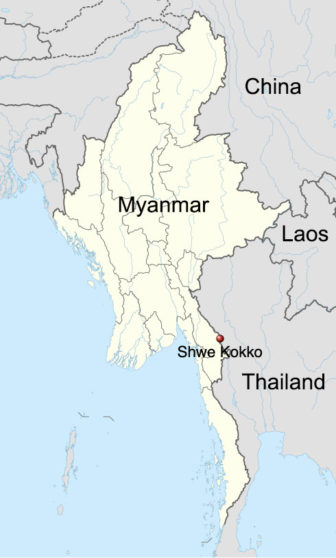
Shwe Kokko, one of two “Chinatowns” that have emerged on the Thai-Myanmar border south of the actual Golden Triangle. Source: Wikipedia
For the present situation on the ground in the Golden Triangle, which has not changed since the February 2021 military takeover in Myanmar (the Ministry of Border Affairs has always been under military, not civil, control), see this 2019 investigative piece in Asia Times. It describes how two “Chinatowns” have emerged in areas on the Thai-Myanmar border to the south of the actual Golden Triangle, which are controlled by former ethnic Karen rebels who have made peace with the Myanmar military and are now so-called “Border Guard Forces.” The first was Shwe Kokko, an enclave across Thailand’s border with Myanmar, some 500 kilometers northwest of Bangkok and 420 kilometers east of Yangon, Myanmar’s commercial capital. Technically inside Myanmar, but more easily accessible from the Thai side of the Moei, new, massive buildings have been constructed there. Some are hotels and apartment blocks, while others house restaurants, karaoke bars, beauty salons — and casinos. The Chinese-built project covers 2,000 acres, or more than 800 hectares, and has been approved by the official Myanmar Investment Commission. According to the Asia Times story, the investment is backed by a Chinese state company which was registered with the Myanmar Ministry of Planning and Finance. When completed it will include shopping malls, trade centers, golf courses, and perhaps even an airport.
A similar project is underway inside Myanmar south of Mae Sot, and also in an area controlled by a Karen ethnic armed group that has entered into a ceasefire agreement with the Myanmar military. The investors are ethnic Chinese who previously operated in Cambodia. They relocated to Myanmar after Hun Sen’s government in Phnom Penh introduced new legislation in 2020 that restricted the casino industry in Sihanoukville. The main player in this second casino zone is Wan Kuok Koi — known by the alias “Broken Tooth”— a gangster who previously spent 13 years in a Macau prison on charges of involvement with an “illegal organization,” in this case, the local chapter of the 14-K Triad. He was released in 2012 and, according to a 2020 report in The Irrawaddy, set up a number of legitimate-looking front groups and enterprises, which could not have been done without some kind of cooperation with powerful Chinese business interests.
In August 2022, one of Wan Kuok Koi’s associates was arrested in Bangkok on charges of running an illegal online casino. This man reportedly invested in gambling ventures in Cambodia and the Myanmar border village of Shwe Kokko as well as a lottery venture in the Philippines. Both online and traditional casinos continue to operate in Shwe Kokko and the gambling zone south of Mae Sot.

Construction of the Kings Romans Casino in Laos, viewed from the Thailand side of the Mekong river. The casino is located in a Special Economic Zone, where Chinese businessmen have invested vast sums of money in tax-free development projects. Image: Shutterstock
Another place that has attracted the attention of law enforcement agencies, as well as investigative reporters, is the Kings Romans Casino in Laos, located at the intersection of the Laos, Thailand, and Myanmar borders. It is part of the Golden Triangle Special Economic Zone (GTSEZ), where Chinese businessmen have invested vast sums of money in tax-free development projects. Kings Romans has been granted a 99-year lease, at the end of which all properties are supposed to be handed over to the Laotian government. Kings Romans has its own security force inside and outside the casino, where visitors will find slot machines as well as games such as baccarat, blackjack, and roulette. In 2017, The New York Times ran an article highlighting the trade in illegal wildlife at the casino and how its zoo is used as a holding station for slaughtering tigers and other endangered species. The US Treasury Department has also linked Kings Romans to drug trafficking and money laundering.
As shown above, there is plenty of background material that can be used, but remember to bring something new to the reporting about casinos in the Golden Triangle and related money laundering issues. The story has to be brought forward and one way to do that would be to “follow the money” back and find out in whose pockets it ends up.
Table of Contents | Introduction | Chapter 1 | Chapter 2 | Chapter 4 | Chapter 5 | Chapter 6
Additional Resources
Reporter’s Guide to Investigating Organized Crime
How to Investigate Money Laundering
GIJN Toolbox: Hunting for Secret Money and Financial Conflicts of Interest
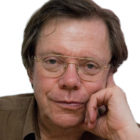 Bertil Lintner is the author of 22 books on Asian history, politics and crime. He is currently with Asia Times and a former correspondent with the Far Eastern Economic Review, the Swedish daily Svenska Dagbladet, and Jane’s Information Group in the UK. Lintner lives with his family in Chiang Mai, northern Thailand.
Bertil Lintner is the author of 22 books on Asian history, politics and crime. He is currently with Asia Times and a former correspondent with the Far Eastern Economic Review, the Swedish daily Svenska Dagbladet, and Jane’s Information Group in the UK. Lintner lives with his family in Chiang Mai, northern Thailand.